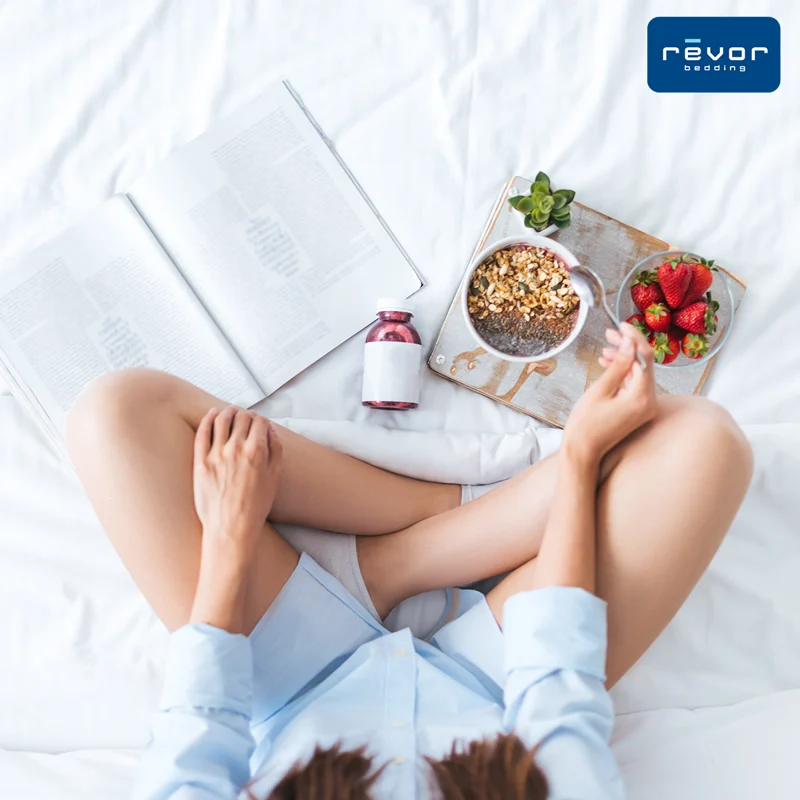What effect does food have on your sleep?!
No, you're not the only one who enjoys a piece of chocolate as a dessert while sitting on the couch late in the evening. And yes, it can be delicious! But is it good for your sleep?

Did you know that what you eat can greatly affect the quality of your sleep? Many people experience sleep problems without realizing that their diet might play a role. In this blog post, you'll discover which foods can improve your sleep and which ones are better to avoid. This way, you can optimize your night's rest and wake up feeling refreshed the next morning.
The impact of caffeine on your sleep
A cup of coffee in the afternoon may seem harmless, but caffeine can remain active in your body for up to six hours. This means that if you drink a cup of coffee at 4:00 PM, you may still have trouble falling asleep by 10:00 PM. However, caffeine is not only found in coffee. Dark chocolate, green tea, and even some soft drinks also contain caffeine, which can negatively impact your sleep.
Tips for better sleep:
- Avoid caffeinated drinks and snacks in the six hours before bedtime.
- In the evening, opt for herbal teas or caffeine-free drinks.
Alcohol: friend or foe of sleep?
Alcohol has the reputation of helping you fall asleep faster, but it greatly reduces the quality of your sleep. While you may drift off more quickly after a glass of wine, alcohol causes you to sleep less deeply and wake up more frequently during the night. The result? You wake up the next morning feeling anything but refreshed.
What can you do?:
- Try to avoid alcoholic beverages before bed.
- If you want something to drink before sleep, choose water or a glass of milk instead.
Foods that can promote sleep
Fortunately, there are also foods that contribute to better sleep. A small, light meal rich in carbohydrates and proteins can help you fall asleep faster and sleep more deeply. For example, a glass of warm milk with honey. Milk contains tryptophan, an amino acid that promotes the production of melatonin, the hormone that regulates your sleep. Honey causes a slight increase in insulin, helping the body better absorb tryptophan.
Recommended snacks:
- Milk with honey
- Turkey or chicken
- Pumpkin seeds and nuts
- Bananas
- Oatmeal
Avoid large meals before bedtime
While a light snack can help, it's important to avoid large meals right before bed. A heavy meal raises your body temperature, making it harder to fall asleep. Additionally, a full stomach can cause discomfort, such as heartburn, disrupting your sleep.
Tips for a healthy pre-bedtime meal:
- Have your last meal at least two to three hours before going to bed.
- Choose easily digestible foods like vegetables, whole grains, and lean proteins.
The role of melatonin and tryptophan in your diet
Melatonin is a hormone naturally produced by your body that helps you fall asleep. Foods such as milk, eggs, nuts, and fish are rich in melatonin and tryptophan, which encourage your body to produce this sleep-promoting hormone.
Foods rich in melatonin and tryptophan:
- Milk
- Cherries
- Fatty fish (like salmon and tuna)
- Eggs
- Nuts (especially almonds and walnuts)
Eat smart, sleep better
Nutrition plays a crucial role in the quality of your sleep. By avoiding caffeine and alcohol, limiting large meals, and choosing foods rich in melatonin and tryptophan, you can significantly improve your sleep pattern. Small changes in your diet can make a big difference for a good night's sleep.
Make sure that your diet becomes a supportive factor in your sleep routine, so you can enjoy deep and rejuvenating sleep every night.
